#ancestry veneration
Explore tagged Tumblr posts
Text

Death Working Plants to Grow on your Altars or in your Home:
I wanted to encourage the idea of a list of herbs and plants that can be somewhat easily grown in the home or on an altar or small space. I have provided some house plant options for death working witches or practitioners. There are many herbs and plants associated with death work however you may not see them listed here as they are not well grown indoors or may be difficult to grow indoors. I have a masterlist that exists already however, I wanted to list herbs and plants that would be easy to somewhat easy for practitioners as well as common, affordable, and accessible to people with varying skills, experience, or knowledge of plants. In this effort I hope to encourage people to take a leap and try out some plants!

Parsley - Difficulty: Easy Light Requirements: Full Sun Water: Weekly (Do not over water) Notes: Is said to please spirits of the dead and ward away the spirits of the dead of whom are malignant or angry.

Rosemary - Difficulty: Medium Light requirements: Full Sun Water: Do not over water. Water when Top Inch of soil is dry. Notes: Rosemary cleanses and banishes as well as is used to honour the dead. There are recipes for rosemary bread. Bread is often used as an offering for ancestor veneration and to the dead. Notes: Rosemary itself is also associated with remembrance of the dead and the memories of the lives they have lived.

Thyme - Difficulty: Medium Light requirements: Full Sun Water: Allow to dry out *completely* before watering. When watering, saturate thoroughly. Notes: Thyme is used to sooth the spirits of the dead of whom experienced great suffering. Thyme is used in Necromancy when communing with the dead and its oil has been historically used in embalming!

Peace Lily - Difficulty: Easy to Medium Light Requirements: Won’t die in low light but prefers bright indirect light. Water: Water when the top inch of soil feels dry, and allow water to drain through the bottom of the pot. Notes: The Peace Lily is actually a rather hearty plant to grow indoors and lives a rather long life. The plant itself is said to sooth the dead and the spirit of those experiencing grief and is a wonderful plant to maintain harmony with the dead. You may also use it in a space while making efforts to reconcile with the dead.

Basil - Difficulty: Easy (Though is prone to pests when grown outdoors) Light Requirements: at least 6 hours of bright light either direct or indirect. This is a light happy plant. Water: Can be grown hydroponically (completely in water). Allow top inch of soil to be completely dry. Water thoroughly. Leave to dry. Notes: Basil is an excellent herb to have growing for communication with the dead. Basil is an excellent herb for all spirit communication and is recommended to be in all arsenals.

Lemon Balm - Difficulty: Easy - Medium Light requirements: Allow 5-9 hours of direct or indirect bright light. This is a light happy plant. Water: Similarly to Mints and Basil, Lemon Balm can be grown hydroponically. Water when top inch of soil is dry. Water thoroughly. Notes: Lemon Balm is used in Necromancy and Psychopomping work to help aid in the passing of souls and to get to the root of what may be holding the spirit of the dead back. Aids in the spirit’s memory recall especially when used in companion with Rosemary.

Orchids - Difficulty: Not As Hard As You Think Light Requirements: Most enjoy 6-8 hours of indirect light a day. Some prefer more some prefer less. Water: When growing and flowering it may need water twice a week. Use the “One inch of dry soil” method to determine when it needs water. Do not over water it. When it is done flowering, it needs less water. Simply soak the roots in water for 15-20 minutes or let a trickling amount of water pass through them. Notes: Orchids have historical background with the story of Orchis whom was killed by maenads but was turned into an Orchid upon death. The Orchid is an excellent herb to represent the cycles of life and death but also love and love within death and the death of loved ones including romantic.

Mint - Difficulty: Easy Light requirements: 3-5hours of indirect sunlight to partial shade. Flexible with light. Water: Can be grown hydroponically. Likes water but should not be regularly saturated. Notes: Mint oil is a stable of Necromancy reagents and is commonly used to communicate with the dead. Said to carry the messages of the dead when made into inks and used in sending parchment messages to the dead. Necromancy Inks often use mint as a part of its structure.

(False) Rose of Jericho - Requires similar but different cares. Difficulty: You Cannot Kill This Plant Light Requirements: Low light prefers indirect light. Does not require Soil. Water: Can be kept in a bowl of water. Will curl up as it dries out. Can be potted but must be in well draining soil. Notes: The Resurrection Plant is in its name. This plant goes through symbolic life and death as it cycles through incredible cycles. It goes into various states of stasis. This is a wonderful plant representing life, death, and rebirth. Both Rose of Jericho and False Rose of Jericho are incredible motifs of this theme.

Yucca - Difficulty: Easy Light Requirements: Prefers Indirect Bright light Water: Water Deeply during spring and summer when the soil is dry. Decrease water intake during dormancy (winter and fall) Notes: Yucca has a folkloric history of being associated with rebirth and transformation in indigenous American Tribes. It also holds symbolism of purity and growth through trails. The Yucca retains water in its roots and links to the Motifs and symbolism of rivers of the underworld. It is has been culturally given as a houseplant to represent growth through grief and difficulty after great loss.

#death work#necromancy#death witch#house plants#witchcraft#herb magic#ancestry work#ancestry veneration#wortcunning
41 notes
·
View notes
Text
Ancestral Veneration and Why it’s Important
This is going to be a post about a topic that people seem to forget or deem unimportant even fearful about with either good reasons or just never thought about it. I just wanted to mention YOU DO NOT HAVE TO WORK WITH ANCESTORS IN YOUR PRACTICE this blog is mostly for those who are interested in it and not sure what ancestral veneration is.
I’m a pagan and a witch that practices Ancestral veneration in my practice, not around it but it’s definitely a big part of why I practice certain paths. I’ll go in beginner tips, what to expect and the myths, the offerings and the recommendations. But let me go a bit into the importance of Ancestral Veneration and worship in human history since it’s still prevalent today.
Historical importance of Ancestral Worship
Ancestral worship and veneration has been at least one of the oldest religions that humans have ever believed in. Archaeological evidence shows the early humans taking care of their dead and burying them for respect and dignity maybe even courtesy to the deceased. It became sacred to them, imagine back then without fully understanding about the world someone that you spoke and saw now gone, it’s a profound moment one’s life that they must believe that their spirit lives on and they themselves wanted a peaceful resting place. It’s a cycle, many cultures and religions believe that life is a cycle, death is never the “end” rather an end of a journey to a new part of one’s life.
To this day people honor their deceased loved ones, visiting their graves, offering them gifts at their resting places, speaking to them, having their picture on a table surrounded by their favorite flowers, etc. Honoring the dead and respecting the dead is a very revered part of human life and something that we all would like to expect when we’re gone from our living family. Spirits also related or not, the dead as well should be treated with outmost respect and dignity like our ancestors did.
Some cultures like the Romans believed that if the spirits especially ancestral spirits (Lares) weren’t appeased they become angry if worshipped improperly or their will have not be been fulfilled. In Ancient Greek tradition they would place a coin in the mouth for the deceased to make sure their spirits would go into the afterlife safely and less traumatic. Each culture and society had a different way of how the ancestors would live in the afterlife.
Even in the Christian Bible shows the significance of ancestors, there is a reason why genealogies are included in the Bible. How Jewish people revere Abraham as their founding father since he is the first Hebrew patriarch which is very important to them and their religion. How even Jesus is related to David on both sides. Even immediate family is important like Jesus’s mother Holy Mary. In Norse Paganism it’s said that the kings were descend from gods like the Swedish Royal family related to Freyr. In Shintoism it is said that the First Emperor of Japan is related to the Sun Goddess Amaterasu. Japan and other many East Asian countries have a strong relationship and traditions regrading Ancestors.
Why Ancestral Veneration?
Ancestral Veneration is generally taken outside of paganism and witchcraft a very sacred thing for families, they can heal, they can come together, grieve together, reminisce together especially if they knew that person in life. But also asking the deceased loved ones for guidance and protection, to help their family in life whom they love the most. Plus this can help especially if you are into past life regression, we reincarnated with our ancestors many times and they have been able to see us in their time and now. It can be really insightful to understand of who we were in those lives.
Whatever legacy they left behind that you admired from them is continued for generations to come as well as heirlooms, a mother passing down her sentimental items to daughters or their children alike it’s a remembrance of what they were known by as well.
“Cows die, family die, you will die the same way . I know only one thing that never dies: the reputation of the one who’s died.” Havamal, Stanza 77.
If you’re going into paganism or witchcraft or both that are related to your ancestry. Your ancestors are the best teachers and mentors especially if they also have been in these specific practices and traditions. If you want to learn Seidr for instance a magical practice rooted within Scandinavian traditions and you have said Scandinavian roots you can contact a ancestor that practiced it in life and willing to help and teach you. What’s unfortunate about ancestral veneration looking down upon for many centuries making people turn away and against the practice is that it’s said that spirits can become lost if they aren’t being honored or remembered that makes them fade and lost.
Five Myths about Ancestral Veneration and what to expect. This is not going to be sugarcoated, I’m being honest and this what I’ve experienced in my own practice and how many others have experienced as well. I would add on if I forgot anything but these are most common misconceptions I have heard. The red are the myths if you are wondering.
Myth #1: All ancestors on the other side have my best interest and support all what I’m doing This is a common misbelief, now there is ancestors that will support you no matter what and your actions. But if you’re a pagan and a witch there is going to be Christian ancestors who won’t support you at all. Their human spirits with still human functions and beliefs. Not to say you can’t communicate but set your intentions and boundaries before meeting them, some will tolerate and some will make their opinions and beliefs known possibly even try to convince you. I know it sounds like fear mongering but it’s to what you would expect. This doesn’t mean you cannot make contact or venerate them because of it. It’s a choice that is a two way street, even spirits in the other side have freewill just like we do.
Myth #2: All Ancestors are well in spirit No, not exactly, when humans on earth do horrible things or experience horrible things it will take affect in the spirit world no matter what. Keep in mind time works very differently in the other world that it will take centuries for those who are healing to fully recover and those to actually realize their problems, messed up life on earth if they choose to recognize it. Again as I said just humans in the physical world human spirits also have free will and choices.
Myth #3: Only Human spirits are ancestors Nope commonly yes when we think of Ancestors we think of human beings that lived either with us or before us. But this isn’t the case, pets for instance that became our beloved family members and part of our inner circle are our ancestors. My cat that recently passed I had him since I was nine years old, I always thought and treated him like family because of that he merged into my family circle. Also animals can symbols of family, like a bear, an owl, an elephant, etc. that they can be represented as your ancestors as a whole.
Myth #4 : Ancestors are limited to just blood family Also a misconception, close friends and even adopted family members are considered to be close family. Some people won’t have blood relatives in life and find their found family which is just as valid and meaningful like a blood family is. This also goes to if you’re a person that likes to write you might venerate your favorite author, if you like to draw or paint you can venerate an artist that you admired a lot. Your family might have patron saints, deities, or local heroes and spirits that have been part of your family for generations. That’s why it’s nice to know where your family originated from what country, village, city, etc.
Myth #5: No Ancestors of mine did anything wrong Everyone’s ancestors did something horribly wrong in their lifetime, some were messed up people. But there are good ones that aren’t like that anymore, if you want to venerate them that’s up to you and your practice. I personally don’t do it because especially if they did something wrong and have no remorse for it I ain’t venerating none of them.
There is no reason to be afraid.
I know I seemed to be fear mongering in the previous part that’s because I don’t want to sugarcoated of which is most likely to be expected.
The Bottom line when contacting (if you want to have contact with them) and venerating your ancestors is that their no different from a human person in this physical realm. They will have personalities, likes, dislikes, opinions, beliefs like any other human being BUT from my experience a lot of my ancestors are very wise, humorous, kind, and non-judgmental. My advice if you really want to contact someone who is going to be supportive and helpful in your paganism and witchcraft, ask specifically for that person I usually ask for ancient ancestors pre Christian wise but there many folk witches and pagan ancestors that are more modern and recent that can most definitely help you! Speak to them like any other human interaction would be as if you’re talking to a living friend, family member or complete stranger you’re meeting for the first time.
How to Communicate with your ancestors
I have mention “contacting” your ancestors you can speak with them it’s not impossible.
1. Meditation and dream work: Most common and effective way to really get them to communicate you and send signs is through dreams. Meditation for a clear and close connection with them.
2. Tarot: Very common and just as effective, my most recommended first step when communicating with your ancestors. Using a tarot deck can help with putting your foot through the door. There is a great book which will recommend at the of the blog that does ancestral and tarot together.
3. Pendulum and a spirit board: This is more in depth but it has been very effective for me and many others to really connect and communicate with my ancestors. It’s good to state your intentions and boundaries before doing any of said above, but this is where you really need to set it. Before starting grab the pendulum over the board don’t let it swing and say, “I ask of the good and supporting ancestors that have me in good intent and support of my path and practice, I would like to meet you”. Of course you get specific like “I would like to meet an ancient Roman ancestor” that’s just an example of how it would go safely and respectfully.
4. Just talking to them. Yep sounds easy enough, you would just get something that represents ancestors or even a specific ancestor. For instance your grandmother’s rosary and just talk to them or pray to them. It’s a very simple and comforting way to bond with your family.
Offerings
This is going to be a “it depends on the ancestors” but there has been a universal notion of what ancestors do really like. From items, food, drink, etc.
Rosaries for catholic ancestors or the cross for Christian ancestors generally speaking
Pagan symbols for your pagan ancestors
Statues of ancestral gods or saints or other important entities
Sweets: Cookies and cakes are very popular
Alcohol: my Germanic ancestors love it when I offer beer, mead, ale. But also wine and other alcoholic beverages for others.
Regular libations like water, coffee, tea. juice, etc. good substitute if you cannot use alcohol.
Their meals from their home country, my Italian ancestors, recent and ancient love it when I make them pasta.
Incense some cultures call it the food for spirits
Heirlooms
Family photographs
Candles
Coins
Book of the dead, if you meet an ancestor you can record them down into a book that is solely for your family and to be passed down on and on. It’s a memorial service to them that someone knows their name and who they were.
Specific traditions that your ancestors came from for instance libations of wine for your Greek ancestors.
Good ancestral veneration books that personally helped me a lot and I know a lot of others to get started.
Ancestral Tarot by Nancy Hendrickson she helps how to contact and connect with your ancestors and ancestry using tarot
Ancestral Grimoire by Nancy Hendrickson like Ancestral Tarot she goes how to connect with your ancestors but this time how to really work with them. One of the exercises is to work with an ancestor for a month and a different for the next one.
Honoring your Ancestors by Mallorie Vaudoise she gives good information on different ways to connect with your ancestors, the different types of ancestors, she does have a Southern European and Catholic folk magic take to it which is fine but it’s not the sole focus of it but she does put good information in the book to help someone get started. 
Badass Ancestors by Patti Wigington also good beginners guide to ancestral veneration and how to connect through meditations and develop relationships with them even how to deal with problematic ancestors. She goes into how to research your genealogy and useful tips!
#paganism#hellenic polytheism#witchcraft#hellenic community#norse paganism#celtic paganism#kemetism#ancestral worship#ancestry#ancestral veneration#paganblr
132 notes
·
View notes
Text
I’ve heard some people saying you can’t or shouldn’t work with your ancestors if you’re white. I think this is an exaggeration of what is actually reasonable. Use discernment! Not all your ancestors were bad people. Perhaps most are. But you DONT have to work with those rotten ones (Nazis, sexists, homophobes, abusive assholes, slave owners). The truth is, not everyone in history was evil like that. Did your white ancestors benefit from white privilege? ABSOLUTELY. So do ALL white people, even the ones who don’t like or subscribe to racism. Even current living ones. The misconception with ancestor work is that you have to apparently “like everything about them and treat them like a flawless deity”. Which is so SO wrong. You should treat your ancestors like you’d treat your living family and friends! If your friend started calling someone homophobic or racist slurs would you continue to take their advice and hang out with them? NO. So, ultimately what I’m saying is that discernment is key. My white great grandmother was an amazing woman. She wasn’t perfect, but she was beautiful and strong of heart. She was a bold and flamboyant woman, and was an advocate for women expressing their sexuality and pursuing their dreams at a time when that was absolutely frowned upon. She made mistakes, but she grew from them. I had the honor of having her in my earlier years of life. And she didn’t discriminate against the lgbtq community, in fact was friends with a lot of gays because they were working in the same industry as her (dancing, modeling, art, etc). I love her and I love working with her. I honor the right things she did, and I learn from the problematic decisions she made and regrets. So yeah, don’t discount your ancestors just cause they’re white. There’s a good chance they‘lol be racist. But there’s an off chance that instead they’d actually genuinely ok people who you can learn from their experiences. I hope this post doesn’t come off wrong. I’m not saying honor racists and homophobes. I’m saying don’t throw out the nice babies with the yucky bath water.
Reblog with polite corrections or perspectives if you find this wrong or dumb in anyway! I’d love feedback and am willing to hear others perspectives!
#witchblr#witchcraft#witch#spirituality#witchy#ancestors#ancestral#ancestor veneration#ancestry#ancestor work
398 notes
·
View notes
Text
When you research your family tree and find confederate soldiers, plantation owners, fundamentalists, and oil exploitation…. Won’t be venerating them.
Can anyone relate? How do you handle this?
I was connecting to my folk practice through my ancestry but now I’m not sure that’s the move.
26 notes
·
View notes
Text
fellow witches and practicers of ancestral veneration—
what are your favorite ways of communicating directly with them? I see people all the time being like “oh my ancestors keep trying to have me get married” etc. but how are they getting that?
I have used a pendulum with one of my ancestors and felt really good about it. I’ve also done tarot which I like but feels a little less direct? I feel like I mostly communicate with the universe through tarot.
Or do you look for signs, etc? Dreamwork?
I think this is the thing that confuses me the most x
#witchblr#ancestor work#ancestry#ancestors#ancestral veneration#witchy#witch community#paganism#Slavic witch#Germanic witch#norse witch#celtic witch#tarot#spirit communication#spirituality
15 notes
·
View notes
Text
My grandfathers' native languages sit like stones at the back of my tongue. My ears echo with whispers of words that are alien to me.
I've never touched the land that they held so dear, or saw the views which took their breath away.
My grandmother used to say she'd bring me home one day, but which home? And is she home now, at peace with the man she loved and the man who loved her?
I feel the sands in my veins and the spices in my words,
Yet I see the rains on the moors, and hear the chanting of a language that's dying.
I am not a whole person, parts of me live in places I've never been.
#original poem#writeblr#writers and poets#poetry#sad poem#lost#lost child#the mother land#generational divide#mexico#scotland#italy#home sick#for a home ive never known#ancestry#ancestors#ancestral veneration#ancestral healing#ancestral home#second generation#american#lost culture#familial bonds
41 notes
·
View notes
Text
Ancestor Worship: Venerating the Dead
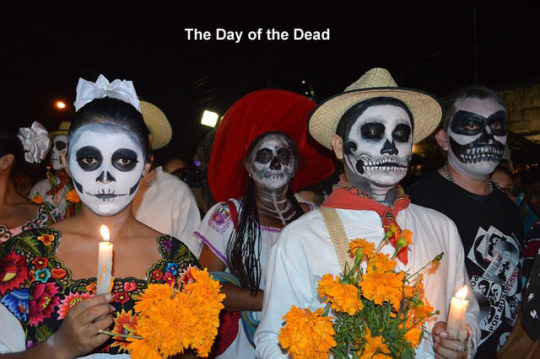
Ancestor worship is a tradition with roots in diverse cultures across the globe, transcending time and geographical boundaries. This practice involves honoring or venerating deceased family members, believing they possess a continued existence and can influence the living. Veneration simply means showing profound respect, reverence, or glorifying an individual. It's also a way of remembering the dead and communicating with their spirits in the afterlife. The venerated dead also act as intermediaries between the gods and the living. This blog post delves into the history, significance, and various practices of ancestor worship, illustrating its enduring relevance in contemporary societies.
The Roots of Ancestor Worship
It is thought that the emergence of venerating the dead occurred somewhere during the Upper Paleolithic era as society transitioned into a more complex hunter-gatherer system. The existence of burial sites with bountiful offerings is perhaps one of the obvious indicators in confirming that veneration of the dead did indeed exist then. Evidence of ancestor worship has been found in ancient civilizations like China, Egypt, Greece, and among indigenous cultures worldwide. In China, the practice is deeply embedded in Confucian philosophy, which emphasizes filial piety--a respect for one's parents, elders, and ancestors. Ancient Egyptians believed in the afterlife and constructed elaborate tombs for their pharaohs, whom they revered as gods. Similarly, the Greeks honored their deceased with rituals and offerings, believing that the dead could intervene in the world of the living.
Ways to Venerate the Dead
There are many ways people venerate of the dead. Shrines are a common means of honoring saints, ancestors, and holy figures. They can be set up in public, in places of worship, at tombs, or in private houses as a designated space for veneration and remembrance. Another means of veneration is making offerings. In pharaonic times, objects like statues or stelas were offered to the dead with texts asking for assistance or blessings. Foods and gifts are common offerings in both ancient and modern traditions. Another form of veneration entails the living speaking directly to saints, ancestors, or divinities through prayers or letters, and asking for intercession with the gods.
Key Historical Practices
China: Ancestor worship in China involves rituals such as cleaning ancestors' graves, offering food, and burning incense during festivals like Qingming and the Ghost Festival.
Egypt: Egyptians practiced mummification to preserve bodies for the afterlife, accompanied by grave goods intended to support the deceased in the next world.
Greece: The Greeks performed libations and sacrifices at the graves of their ancestors, believing in their power to bless or curse the living.
The Cultural Significance of Ancestor Worship
Ancestor worship serves multiple functions within a culture. It reinforces familial bonds, instills a sense of identity, and provides moral guidance. The practice acts as a bridge, connecting individuals with their heritage and ensuring that the memories and values of the deceased are passed down through generations.
Reinforcing Family Bonds
Ancestor worship fosters a sense of unity and continuity within families. By honoring their forebears, people acknowledge their roots and express gratitude for the sacrifices made by previous generations. This collective memory helps strengthen familial ties and promotes a sense of belonging.
Instilling Identity and Heritage
Through ancestor worship, individuals connect with their cultural heritage. This connection is crucial in maintaining cultural traditions and practices, especially in a rapidly globalizing world. Ancestor worship reminds people of their origins and the values upheld by their forebears.
Providing Moral Guidance
Many cultures believe that ancestors play a role in guiding the moral conduct of the living. By venerating their ancestors, individuals seek blessings, protection, and guidance. This belief in the moral oversight of ancestors can influence behavior and societal norms.
Modern Practices of Ancestor Worship
Despite modernization and the influence of technology, ancestor worship remains prevalent in many societies. While the rituals may have evolved, the core principles of reverence and connection to the past persist.
Practices in Different Cultures
Asia: In Japan, the Obon festival involves cleaning graves and offering food to ancestors' spirits. In Korea, Chuseok is a harvest festival where families honor their ancestors with feasts and ancestral rites.
Africa: In many African cultures, ancestor worship is integrated into daily life. Libations, offerings, and prayers to ancestors are common practices, reflecting a belief in the active involvement of the deceased in the lives of the living.
Latin America: The Day of the Dead (Día de los Muertos) in Mexico is a vibrant celebration where families create altars, known as ofrendas, adorned with photographs, food, and personal items to honor and welcome the spirits of the deceased.
Adapting to Contemporary Life
Modernity has influenced how ancestor worship is practiced, with many people adapting traditional rituals to fit their urban lifestyles. For instance, digital memorials and online ancestral databases have emerged, allowing individuals to honor their ancestors virtually. Despite these changes, the essence of ancestor worship--honoring and remembering the dead—remains unchanged.
The Psychological and Social Benefits of Ancestor Worship
Ancestor worship offers numerous psychological and social benefits, contributing to individual and communal well-being.
Psychological Comfort
Honoring ancestors provides a sense of continuity and comfort, particularly in times of loss or hardship. The belief that ancestors are watching over and protecting their descendants can be a source of solace and strength.
Social Cohesion
Ancestor worship promotes social cohesion by fostering a shared sense of history and identity. Community rituals and ceremonies bring people together, reinforcing social bonds and collective memory.
Ethical and Moral Framework
The reverence for ancestors instills a respect for tradition and continuity. This respect can translate into a broader appreciation for ethical and moral values upheld by previous generations, guiding behavior in the present.
The Future of Ancestor Worship
As societies evolve, so too will the practices of ancestor worship. The core values of respect, gratitude, and remembrance are likely to endure, even as the methods of veneration change. The integration of technology and new forms of communication will continue to shape how people honor their ancestors, ensuring that this ancient practice remains relevant in the modern world.
Emerging Trends
Digital Memorials: Websites and apps dedicated to creating virtual memorials for ancestors are becoming increasingly popular, allowing for global participation in ancestor worship.
Environmental Considerations: As environmental awareness grows, some traditional practices, such as burning incense or paper offerings, are being reconsidered and modified to reduce ecological impact.
The Enduring Relevance
Ancestor worship's ability to adapt while maintaining its core principles is a testament to its enduring relevance. It serves as a reminder of the importance of honoring one's roots and the timeless human need to connect with the past.
In conclusion, ancestor worship is a profound and enduring tradition that transcends cultural boundaries. It reinforces family bonds, instills a sense of identity, and provides moral guidance. As societies continue to evolve, the practice of ancestor worship will adapt, but its essence will remain unchanged, ensuring that the memories and values of the deceased are preserved for future generations.
9 notes
·
View notes
Text
your ancestry is connected to your root chakra. this is a reason why ancestral veneration is highly revered in many cultures — it is the foundational element to our ascension. our ancestry carries the codes that unlock our innate gifts that were passed down to us, along with fears, blockages, and karma to clear in order for us to truly experience liberation. some ways that we can connect to our root chakra are via:
𖦹 listening to the 396 hz frequency
𖦹 communicating with our ancestors
𖦹 planting our bare feet on soil
𖦹 working with crystals (smoky quartz is my favorite)
𖦹 studying the natural earth houses (2nd, 6th, 10th) + saturn in the natal chart

6 notes
·
View notes
Text




I've been looking at old photos of my mom when she was young (and still lived in Angra do Herosima), and my grandma. I don't know if it's because I got my period today and feeling extra emotional.. (or it's because of health issues going on within the family), but I've been feeling very melancholy.. So much time has passed since grandma passed away. So much has changed since my mom last went to Portugal (1999/2000). Aside from her stories and learning Portuguese, I only have photographs to go by.. (Hopefully, i'll be able to visit Portugal soon).
I lit a tealight candle and made black tea for my grandma today, and invited her to pray the rosary with me. I'm still very new at ancestor veneration, but I hope that she enjoys my company...
First black and white photo is my grandma holding my mom, and my Uncle Peter sitting next to her)
Second black and white photo is my mother as a child.
First colored photo is my mom as a teeanger. She was on a school trip to the gardens, and her and her friend were taking photos of eachother with a disposable camera.
Second colored photo is a random street on what I presume to be Angra do Herosima. My grandma is the woman in the pink shirt.
2 notes
·
View notes
Text
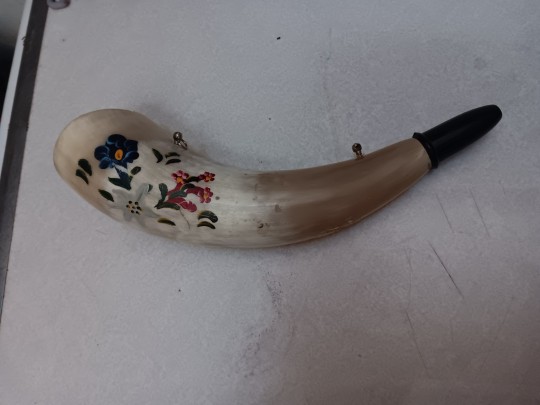
So maybe a year ish ago I found this horn at a thrift shop.
This past weekend I got the opportunity to go to paganicon for the first time. One of the main programs there was the sounds of the Iron age. This amazing person had instruments that were historically made to be similar to norwiegen and norse/Scandinavian of those times. She played them, sang songs, and told stories. Even sang a song of the sagas.
Some of those instruments were made from different goat horns and other animals. Now I believe this is a real horn except for the mouth piece. It is plastic and was made to fit on the end of the horn.
Anywho because of the event I had learned something new about my norwiegen heritage. I honestly don't know much about the different things of my heritages because I have many blood lines and there has been alot of disconnect in culture and community due to generational trauma.
However this weekend I had learned what this horn was and how it's used. It actually has many uses. A horn was sounded to give thanks to hosts of parties or events. A horn was sounded to give thanks to the guests of events. A horn was sounded to honor ancestors and spirits of the lands. A horn was a musical instrument that provided music at parties. It sometimes made the people dance! A horn was sounded to communicat the arrivals of guests. A horn was used to send prayers to the gods. A horn was sounded to call childeren back to the house.
Horns were used for so many things and it sounded like almost every villager had one for the uses they needed it for.
I am proud that I found this gem thrifting. I am so glad that I bought this now after learning about it. I now know how I can use it in my practices and connect with the gods and ancestors with it. It is a beautiful horn.
I was thinking of cleansing it, blessing it, repainting the flowers on it, and putting some runes on it to make it my own.
#pagan#norse pagan#norse heathen#norse pagan witch#norse paganism#norwegian#norwegian culture#Ancestors#ancestor veneration#ancestors#ancestor altar#Ancestoral objects#ancestry#paganpride#paganism#information#thrifstorefinds#thrifting
4 notes
·
View notes
Text
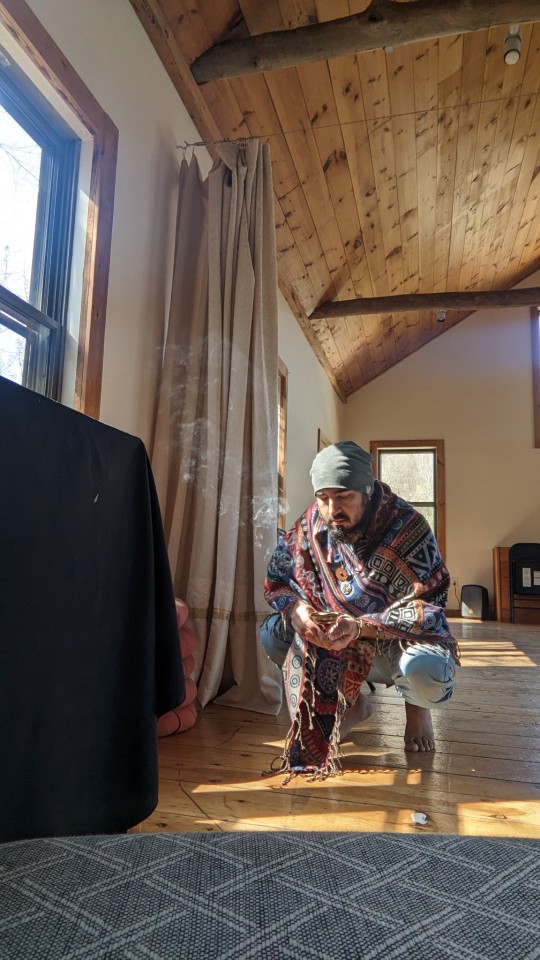
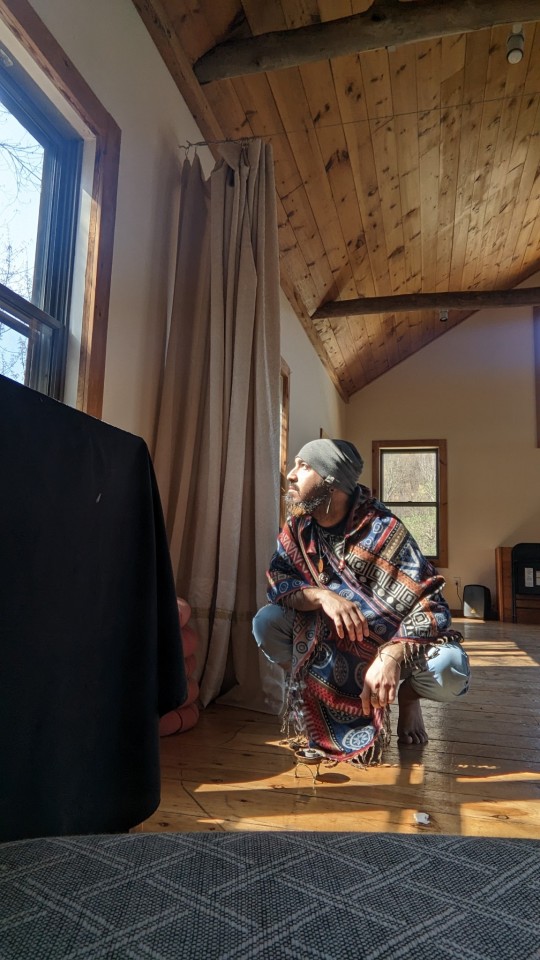
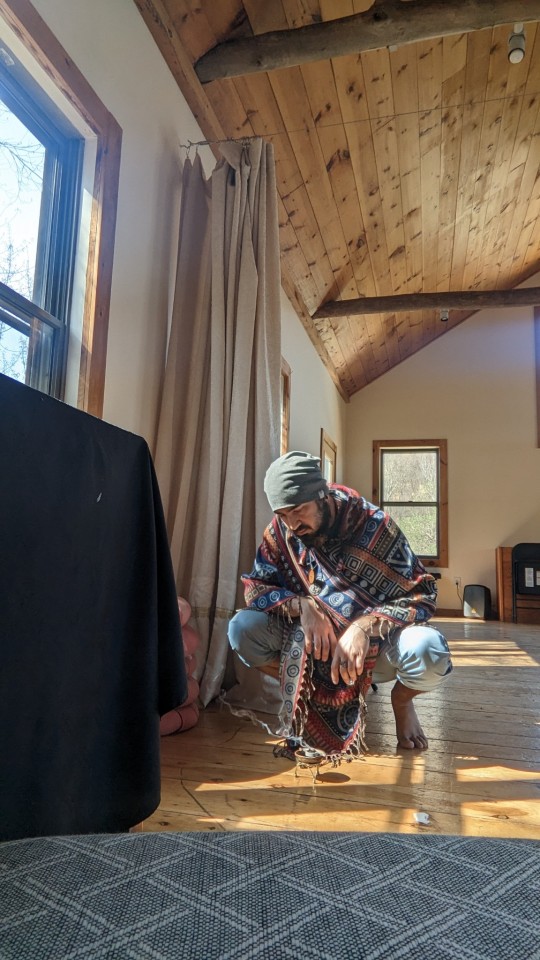
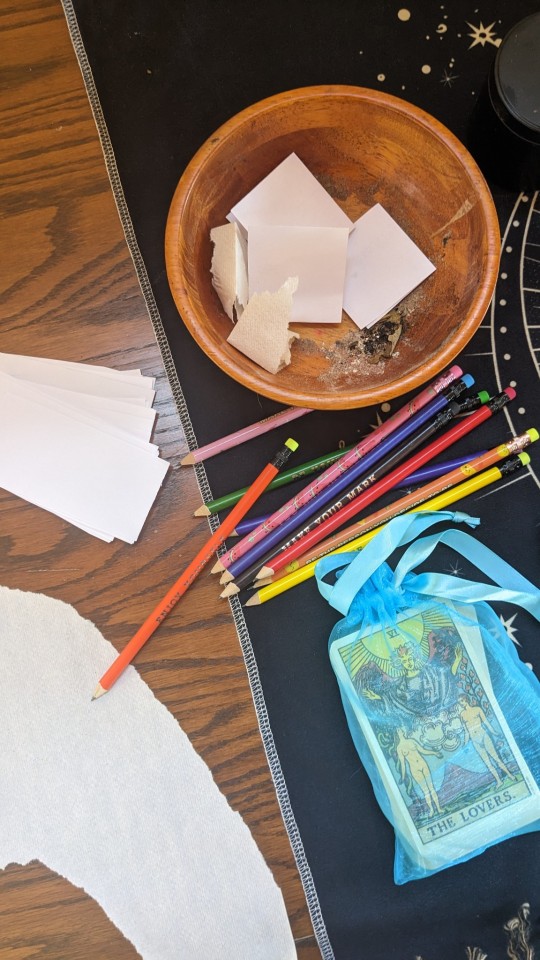

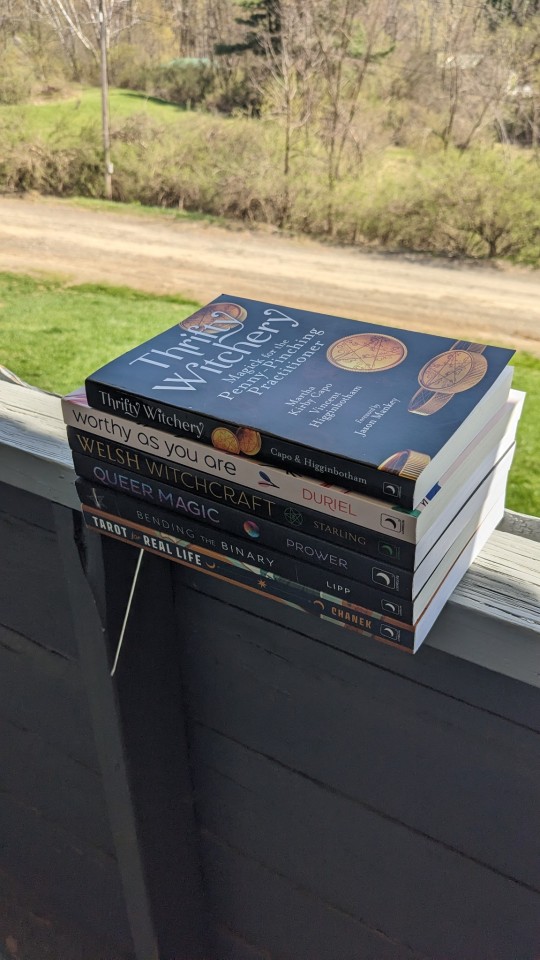
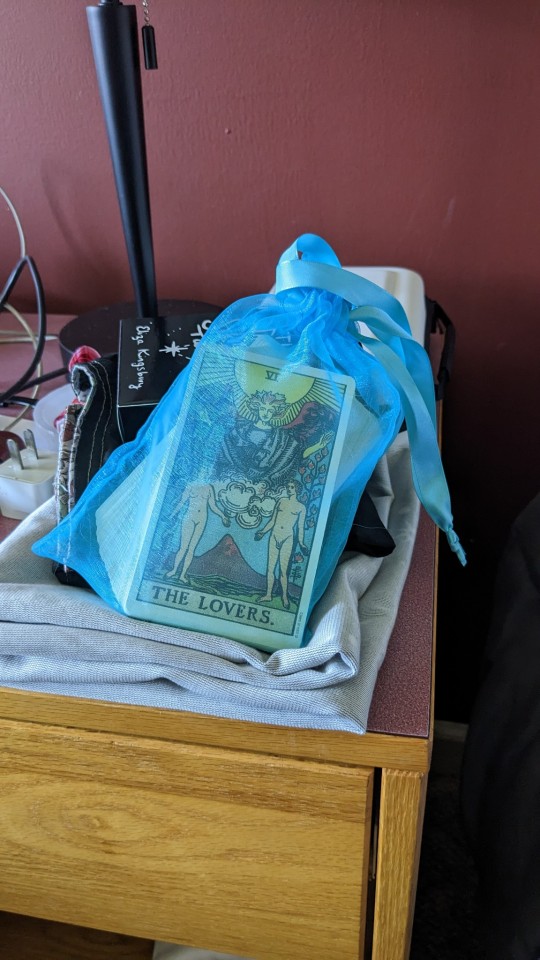
Inhale pain, exhale healing. Do not forget that you are made of dreams, dances, and beautiful songs of your ancestors singing time ago under the stars, through your blood runs the magic of thousands of stories of warriors, sorcerers, healers, farmers, heroes, artists, troubadours, and alchemists.
When you heal; you reclaim your power back.
When you stand up firmly in your power, you heal your ancestors and give them the chance to reclaim their power too.
Hugs warm like warm alpacas.
Xxo, ELO.
#wicca#witchcraft#magick#magic#witches#pagan#wiccan#easton Mountain#Easton Mountain Retreat Center#gay witchcraft#gay witches#gay witch#LGBT#LGBTQIA#LGBTQ#ancestry#ancestral veneration#ancestral worship
11 notes
·
View notes
Text
I found such an incredible recipe for bread that would be wonderful for ancestry work!
4 notes
·
View notes
Text
Why Ancestor Elevation is Essential for the African Diaspora
Join us for an enlightening discussion on the significance of ancestor elevation and its transformative impact on the African diaspora. We’ll explore the ancient practice of honoring and elevating our ancestors according to African tradition. We’ll also discuss how it helps us connect deeper to our roots and empowers us to heal generational trauma. Even more, we’ll examine why ancestor elevation…
#African ancestry#African diaspora#African heritage#african spirituality#African traditions#Ancestor altars#ancestor elevation#ancestor honoring#Ancestral Blessings#Ancestral guidance#ancestral healing#ancestral protection#ancestral veneration#ancestral wisdom#connecting with ancestors#cultural connection#cultural heritage#cultural pride#diaspora identity#generational healing#healing trauma#honoring lineage#identity empowerment#intergenerational trauma#spiritual empowerment#spiritual practices
1 note
·
View note
Text
Anyone on here practice ancestor veneration? Please send me a dm, I would love to discuss this matter with you.
1 note
·
View note
Text
Why I Claim the Label "Witch" Even Though My Ancestors Would Disapprove
Please keep in mind that this decision is a part of my personal journey in my folk magic and ancestor veneration practice.
🌸 I am LGBTQIA+ and neurodivergent.
I'm the black sheep of my family. Historically, people like me would've been at risk for being suspected of witchcraft and ran out of town or worse. By calling myself a witch, I honor anyone in my ancestry who was also ND and LGBTQIA+. I carry their legacy by standing in my power.
🌸 I am not a Protestant Christian.
After receiving a lifetime of religious trauma being raised Church of Christ (Protestant Christian), I left the church in 2012. I've had to sift through my life during hours of therapy to find myself again. Calling myself a witch felt like I was finally in control of my own life again. The cost of giving up the label "witch" for something that made my ancestors happier was far too high. The most I'm willing to do for my ancestors at this time is learn how to use the magic of the Psalms.
🌸 "Healer" is a trigger word.
I have a negative association with this word, and I'm not sure what else to say about it! The title would be disempowering for me because of my religious trauma. I'm not a healer, white witch, good witch, etc. I am me, and I do the magic that serves my purpose. I have my own ethics within my practice.
🌸 I'm the main character of my own life, and I live it for me.
I live the way I want to, and if my ancestors want to work with me, then they have to accept who I am. Or at least be open-minded to learning about who I am and the reasoning behind my choices. If they are not willing, then they do not receive veneration, and I will not work with them. Simple as that!
Those are just a few reasons I call myself a "witch." :) It's important to set boundaries with any spirit you involve in your practice (especially early on when you're getting to know each other and building trust).
#spirit work#witch#witchcraft#ancestors#ancestry#ancestor veneration#folk witch#folk magic#deconstructing christianity#ex fundamentalist#ex fundie#witch blog#witches#witchblr#witch tips
38 notes
·
View notes
Text
today I found like 7 new ancestors while doing genealogy and just felt so giddy. Ive been focusing on my Oma’s tiny Silesian line and followed it from Silesia back to Hungary in the 1600s. I seriously got chills. I’ve never seen Hungary on any of my dad’s lines or Opas and those literally go back to 500s.
I just felt like my Hungarian ancestors were kicking their feet all excited that I found them
#I still have to confirm the sources and what not#but still so fun and neat#ancestor work#ancestry#ancestor veneration#witchblr
3 notes
·
View notes